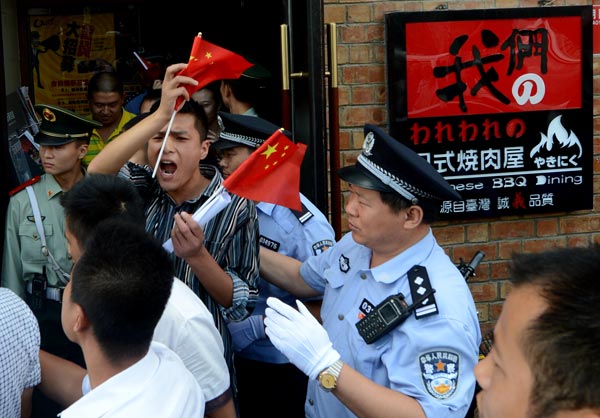
 |
|
Anti-Japanese demonstrators shout slogans as they leave a Japanese restaurant in Beijing on Thursday after protesting over Tokyo's decision to "buy" the Diaoyu Islands in the East China Sea. Mark Ralston / Agence France-Presse |
A senior trade official warned on Thursday that the Japanese government's so-called purchase of the Diaoyu Islands will "inevitably have a negative impact on China-Japan economic and trade ties", while Japanese-funded companies expressed concerns over tensions.
"If Chinese consumers, in a reasonable manner, express their positions and views against Japan's violation of China's territorial sovereignty, I think it is within their rights to do so and it is understandable," Vice-Minister of Commerce Jiang Zengwei said at a news conference on Thursday.
China is Japan's biggest trading partner. Japan's exports to China hit $73.54 billion in the first half of the year, while imports from China were $91.29 billion during the same period, according to statistics from Japanese customs authorities.
A good political environment is the foundation for bilateral ties as well as multilateral economic and trade relations, Jiang said.
Trade cooperation is in line with bilateral interests, but needs concerted efforts from both sides, he said.
Tensions between China and Japan are likely to hurt Japanese companies' revenues in the coming months, and it's an "inescapable task" facing two countries and their people to control the effect on bilateral economic ties, experts said.
Online purchases of Japanese products fell quickly in large e-commerce platforms such as Taobao this week after the Japanese government announced on Monday the "purchase" of the Diaoyu Islands and their affiliated islets.
The Japanese business community knows that trade and economic ties affect Japan's reconstruction and economic recovery after the earthquake and tsunami in March last year, said Feng Zhaokui, former director of Japanese studies at the Chinese Academy of Social Sciences.
Some major Japanese automakers such as Mazda, Toyota and Nissan saw slowing sales in August.
"One major cause of the slipping sales is that Japanese automakers lagged behind in launching new models in the market, compared with their German and American peers," said a senior auto analyst who declined to be named.
"It always takes one or two months for the monthly data to come out, but the political issue will definitely make sales in the coming months worse," he said.
"We hope the territorial disputes will be solved as soon as possible, which will be good for China and Japan as well as enterprises and customers of the two countries," said Shen Li, a spokeswoman for Nissan China.
A Nissan executive said last week that rising tensions are affecting business with China.
Sales of Toyota in China declined by 15.1 percent year-on-year to 75,300 in August.
Niu Yu, a spokesman for Toyota China, said the company has maintained its sales target of 1 million cars in China this year.
Rare earths
China may consider economic sanctions such as curbing rare earths exports if the issue continues to flare up, an industrial insider said.
About 60 percent of Japan's rare earths are imported from China.
"Japan's rare earth inventory is likely to support its demand for one year, but in the long term it still depends on imports," he said.
Some travel agencies have canceled tours to Japan. An employee at the China International Travel Service Limited said they respect some tourists' decisions to cancel their trips.
Yang Kai, director of public affairs of Beijing Ito-Yokado Ltd, a Japanese supermarket chain in Beijing, said sales of its eight stores in Beijing haven't been affected.
A worker in the sales department at Isetan in Shanghai said the tensions have not impacted operations of the store. Isetan is a Japanese department store that opened in Shanghai in 1993.
Isshin Ryori, a Japanese restaurant in Beijing's Chaoyang district, has also not been affected by the flare-up.
"The number of customers has not changed much and the prices of ingredients remain stable," said Ma Delin, an employee at the restaurant. Concerned about the escalating tension, the restaurant has started storing ingredients just in case relations get worse, Ma said.
Meanwhile, an official with the Ministry of Agriculture said on Thursday that China will conduct routine patrols near the Diaoyu Islands to assert the country's sovereignty and protect fishermen.
In order to safeguard the interests of China's oceanic fishing industry and ensure safety for Chinese fishermen, the ministry has asked fishery authorities in Zhejiang and Fujian provinces to include areas surrounding the Diaoyu Islands in their regular patrol scopes, the official said.
About 91 percent of the 2,000 Chinese residents in a poll conducted by the Guangzhou Public Opinion Research Center were concerned about the "purchase" of the Diaoyu Islands and 90 percent viewed the move as an act of aggression in the Chinese territory.
Also on Thursday, Taiwan leader Ma Ying-jeou said on Thursday Taiwan will make no compromises regarding the sovereignty of the Diaoyu Islands.
"We will never compromise on it," Ma said while addressing an academic symposium in Taipei.
If the concerned parties agree to shelve their differences and focus on fishing resource negotiations, it will be conducive to regional peace, Ma said. Taiwan has strongly protested Japan's recent move to "purchase" part of the Diaoyu Islands.
Contact the writers at lanlan@chinadaily.com.cn and wangzhuoqiong@chinadaily.com.cn
Tang Zhihao in Shanghai, Ye Yiwen, Hang Tianyang in Beijing and Li Wenfang in Shenzhen contributed to this story.







